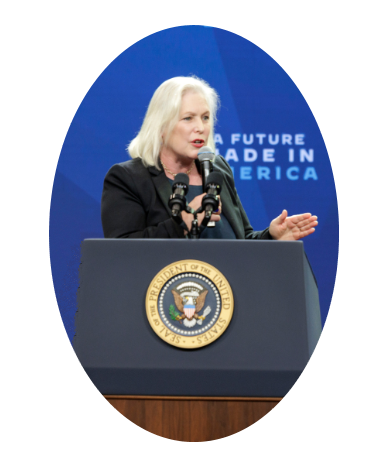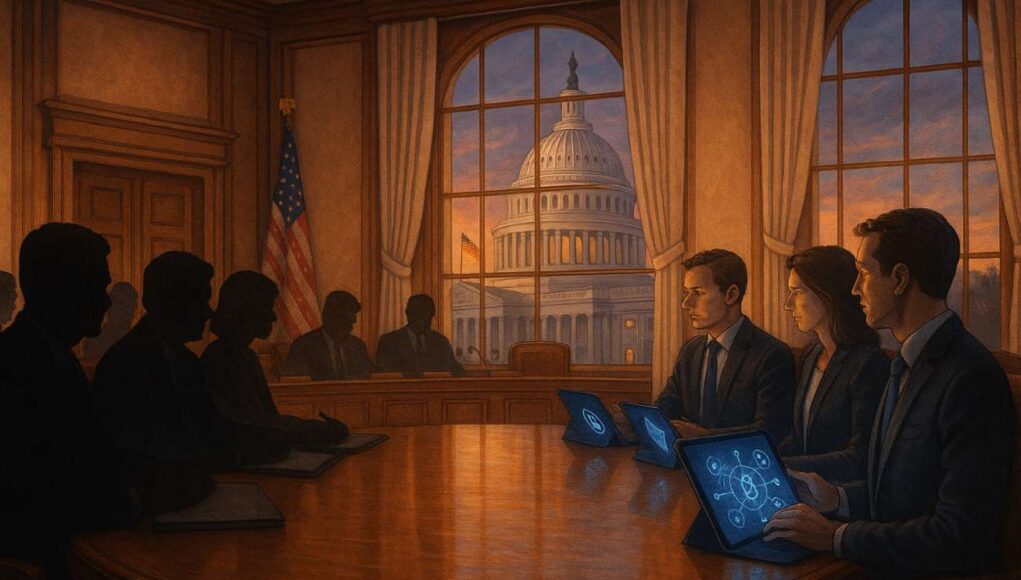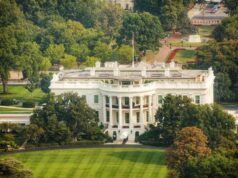On October 22, 2025, Senate Democrats led by Kirsten Gillibrand will host a closed-door crypto meeting in Washington, D.C., with top industry executives.
The goal is to rebuild trust and restart negotiations on U.S. crypto market structure legislation. The initiative comes after a DeFi regulation draft leaked in early October 2025 sparked widespread industry backlash.
The senate democrats’ crypto meeting marks the first coordinated engagement between lawmakers and leading crypto firms since the controversy that froze bipartisan cooperation earlier this month.
A Closed-Door Meeting to Revive Market Structure Talks
The senate democrats’ crypto meeting will bring together CEOs and policy chiefs from Coinbase, Ripple, Chainlink, Uniswap, Circle, Galaxy, Kraken, and other major firms.
Hosted by Sen. Kirsten Gillibrand, co-sponsor of the Lummis–Gillibrand bill, the roundtable seeks to re-energize stalled work on crypto market structure legislation. The framework would define how digital assets are classified and which agency, the SEC or the CFTC, has oversight authority.
The House already advanced its version of the bill, known as FIT21. However, it has languished in the Senate amid partisan divisions. Democrats now appear eager to re-enter the conversation before the 2026 election cycle crowds out policymaking entirely.
The DeFi Draft That Froze Dialogue
The immediate trigger for this policy reset was the leaked DeFi draft that appeared in early October 2025 in various media outlets.
The proposal would have required DeFi front-ends, liquidity providers, and even non-custodial wallet developers to perform KYC and AML checks.
Industry groups called it “technically impossible and politically tone-deaf.” The backlash was swift and united. Developers, exchanges, and think-tanks warned that the language could criminalize open-source software and drive innovation offshore.
The fallout left Democratic lawmakers isolated from industry stakeholders and derailed months of progress toward a negotiated framework on DeFi regulation. By convening this roundtable, Senate leaders are signaling a willingness to listen and revise their approach.
Gillibrand’s Bid to Rebuild Trust

For Kirsten Gillibrand, the meeting doubles as a reputational repair project. Although she wasn’t directly involved in drafting the controversial DeFi paper, her office absorbed much of the criticism. After all, she is the most visible Democratic voice on crypto.
Gillibrand’s earlier bipartisan initiative with Sen. Cynthia Lummis, the Lummis–Gillibrand Responsible Financial Innovation Act, had made her a credible bridge between both parties. The DeFi episode jeopardized that status.
Hosting this roundtable allows her to reclaim leadership in shaping crypto policy in Washington. It also demonstrates that Democrats are not anti-innovation but rather seeking clarity and consumer protection.
Inside the Agenda: Stablecoins, Oversight, and Market Rules
This is what the list of key topics reportedly looks like:
- Clarifying SEC vs CFTC oversight in token classification.
- Revisiting stablecoin rules, including reserve disclosure and payment-use approvals.
- Defining boundaries for DeFi oversight without stifling open protocols.
- Improving cross-agency coordination on tax and compliance.
No formal draft is expected to emerge from this session. Instead, the senate democrats designed the meeting as a crypto policy reset. They aim to open channels for future technical consultations and restore dialogue between policymakers and innovators.
Industry Expectations and Skepticism
While the industry welcomes a more open tone, expectations remain low. Executives are approaching the event as a listening session, not a negotiation. They will likely push for market-structure clarity, stronger safe-harbor provisions, and recognition that decentralized protocols cannot be regulated like traditional intermediaries.
Some participants fear the meeting could serve more as political optics than substantive progress. That risk grows if no follow-up process appears. Still, many view any dialogue as an improvement over weeks of silence following the DeFi draft backlash.
>>> Read more: Crypto Coalition Presses Senate for DeFi Developer Protections
What Happens Next
Following the meeting, Senate staff are expected to prepare an internal summary for cross-party review. If talks remain productive, Gillibrand could seek to re-table portions of the RFIA bill later in Q4 2025. It could merge its market-structure provisions with a separate stablecoin framework already under review.
Whether this marks a genuine reset or merely a temporary ceasefire will depend on how both sides act after the cameras are off.
For now, the senate democrats’ crypto meeting stands as a crucial step toward mending Washington’s fractured relationship with the digital-asset industry. It’s testing whether cooperation can still shape future crypto market structure legislation in the United States.
Readers’ frequently asked questions
What is FIT21?
FIT21 is the U.S. House bill “Financial Innovation and Technology for the 21st Century Act” (H.R. 4763). It sets a federal framework for digital assets, allocating key responsibilities between the SEC and CFTC, including CFTC oversight of “digital commodities” on functional, decentralized blockchains and coordinated SEC/CFTC rulemaking for listings and delistings. The House passed FIT21 on May 22, 2024. :contentReference[oaicite:1]{index=1}
What is the Lummis–Gillibrand Responsible Financial Innovation Act (RFIA)?
RFIA is a bipartisan Senate proposal led by Sens. Cynthia Lummis and Kirsten Gillibrand. It provides a comprehensive digital-asset framework, including common definitions, consumer protections, tax treatment (e.g., a small de-minimis exemption), and rules for payment stablecoins (e.g., 1:1 redeemability and full reserves). :contentReference[oaicite:2]{index=2}
What does “crypto market-structure legislation” mean?
It refers to laws that define how digital assets are categorized and which regulators oversee them, plus registration and conduct rules for trading venues and intermediaries. In current U.S. proposals, the SEC handles securities-like tokens while the CFTC oversees digital-commodity trading, with new categories for platforms dealing in restricted digital assets. :contentReference[oaicite:3]{index=3}
What Is In It For You? Action items you might want to consider
Track the actual bills referenced
Open and bookmark the official pages for FIT21 (H.R. 4763) on Congress.gov and the Lummis–Gillibrand RFIA on the Senators’ sites. Use these sources to follow amendments, summaries, and vote actions.
Subscribe to Senate committee calendars
Set email or RSS alerts for the Senate Banking, Housing, and Urban Affairs Committee and the Senate Agriculture, Nutrition, and Forestry Committee. You’ll receive notices for hearings, roundtables, and agendas tied to SEC/CFTC oversight.
Verify your platform’s policy disclosures
Visit your exchange or wallet’s legal/compliance or transparency page (e.g., Coinbase, Kraken, Circle, Uniswap Foundation). Confirm any posted updates on KYC/AML, listing standards, or stablecoin reserve disclosures and adjust your account settings/documentation accordingly.










